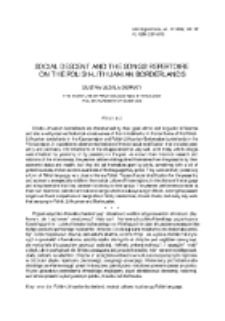- Search in all Repository
- Literature and maps
- Archeology
- Mills database
- Natural sciences
Advanced search
Advanced search
Advanced search
Advanced search
Advanced search

Object
Title: Social descent and the songs' repertoire on the Polish-Lithuanian borderlands
Subtitle:
Publisher:
Institute of Archaeology and Ethnology Polish Academy of Sciences
Place of publishing:
Description:
Type of object:
Abstract:
Polish-Lithuanian borderlands are characterized by their great ethnic and linguistic differences and also a well-preserved historical consciousness of their inhabitants. In the territories of the Polish-Lithuanian borderlands in the Kaunas region and Polish-Lithuanian-Byelorussian borderlands in the Vilnius region, it is possible to observe recollections of the old social stratification that included peasantry and yeomanry. Old inhabitants of the villages remember very well, until today, which villages were inhabited by yeomanry or by peasantry in the past. As known from historical research and relations of the interviewees, the yeomen seldom distinguished themselves from the peasants by their economic status and wealth, but they did set themselves apart by pride, sometimes with a bit of pretentiousness, and an extreme awareness of the language they spoke. They were carefully preserving a form of Polish language, very close to literary Polish. Traces of social stratification for the peasantry and yeomanry are especially visible in the musical culture of those regions, in the choice of the language and song repertoire that they consider to belong to their group. The yeomen performers consider as their own historical, patriotic and national songs, which are always sung in Polish. Among the peasant singers we found a repertoire of songs about family ceremonies, annual rituals, and every day work that are sung in Polish, Lithuanian and Byelorussian
References:
Babiński G. 1998, Metodologiczne problemy badań etnicznych (Methodological problems of the ethnic studies), Kraków
Dzūkų melodijos 1981, ed. Četkauskaitè G., Vilnius
Frasunkiewicz D. 1995, Świadomość Polaków na Białorusi (The Poles consciousness in Byelorussia), [in:] Dziedzictwo europejskie a polska kultura muzyczna w dobie przemian, ed. A. Czekanowska, Kraków
Moszyński K. 1968, Kultura ludowa Słowian, cz. 2, z. 2, Warszawa
„Muzyka źródeł" ("The Origin Musique"), red. M. Baliszewska, A. Szewczuk-Czech, red t. 14. Kresy I, Wileńszczyzna Grodzieńszczyzna, CD
Wojciechowski R. 1969, Pieśni ludu białoruskiego w zbiorze M. Federowskiego, [in:] ed. M. Fedorowski, Lud białoruski, Vol. 7, Warszawa
Żerańska-Kominek S. 1990, Muzyka w przemianach tradycji etnicznej Litwinów w Polsce, [in:] ed. S. Żerańska-Kominek, Kultura muzyczna mniejszości narodowych w Polsce, Warszawa
Relation:
Volume:
Start page:
End page:
Detailed Resource Type:
Format:
Resource Identifier:
oai:rcin.org.pl:61495 ; 0137-4079
Source:
IAiE PAN, call no. P 366 ; IAiE PAN, call no. P 367 ; IAiE PAN, call no. P 368 ; click here to follow the link
Language:
Rights:
Rights Reserved - Restricted Access
Terms of use:
Digitizing institution:
Institute of Archaeology and Ethnology of the Polish Academy of Sciences
Original in:
Library of the Institute of Archaeology and Ethnology of the Polish Academy of Sciences
Access:
Object collections:
- Digital Repository of Scientific Institutes > Partners' collections > Institute of Archeology and Ethnology PAS > Institute Publications
- Digital Repository of Scientific Institutes > Partners' collections > Institute of Archeology and Ethnology PAS > Institute Publications > Current Journals
- Digital Repository of Scientific Institutes > Literature > Journals/Articles
- Digital Repository of Scientific Institutes > Partners' collections > Institute of Archeology and Ethnology PAS > Institute Publications > Current Journals > Ethnologia Polona
Last modified:
Feb 2, 2022
In our library since:
Jan 12, 2017
Number of object content downloads / hits:
25
All available object's versions:
https://rcin.org.pl./publication/77291
Show description in RDF format:
Show description in RDFa format:
Show description in OAI-PMH format:
| Edition name | Date |
|---|---|
| Juzala-Deprati, Gustaw, 2006, Social descent and the songs' repertoire on the Polish-Lithuanian borderlands | Feb 2, 2022 |
Objects Similar
Siatkowski, Janusz (1929– )
Bartoszewicz, Dominik (1801–1851)
Czepieliński, Florian (1822–1900)

 INSTYTUT ARCHEOLOGII I ETNOLOGII POLSKIEJ AKADEMII NAUK
INSTYTUT ARCHEOLOGII I ETNOLOGII POLSKIEJ AKADEMII NAUK
 INSTYTUT BADAŃ LITERACKICH POLSKIEJ AKADEMII NAUK
INSTYTUT BADAŃ LITERACKICH POLSKIEJ AKADEMII NAUK
 INSTYTUT BADAWCZY LEŚNICTWA
INSTYTUT BADAWCZY LEŚNICTWA
 INSTYTUT BIOLOGII DOŚWIADCZALNEJ IM. MARCELEGO NENCKIEGO POLSKIEJ AKADEMII NAUK
INSTYTUT BIOLOGII DOŚWIADCZALNEJ IM. MARCELEGO NENCKIEGO POLSKIEJ AKADEMII NAUK
 INSTYTUT BIOLOGII SSAKÓW POLSKIEJ AKADEMII NAUK
INSTYTUT BIOLOGII SSAKÓW POLSKIEJ AKADEMII NAUK
 INSTYTUT CHEMII FIZYCZNEJ PAN
INSTYTUT CHEMII FIZYCZNEJ PAN
 INSTYTUT CHEMII ORGANICZNEJ PAN
INSTYTUT CHEMII ORGANICZNEJ PAN
 INSTYTUT FILOZOFII I SOCJOLOGII PAN
INSTYTUT FILOZOFII I SOCJOLOGII PAN
 INSTYTUT GEOGRAFII I PRZESTRZENNEGO ZAGOSPODAROWANIA PAN
INSTYTUT GEOGRAFII I PRZESTRZENNEGO ZAGOSPODAROWANIA PAN
 INSTYTUT HISTORII im. TADEUSZA MANTEUFFLA POLSKIEJ AKADEMII NAUK
INSTYTUT HISTORII im. TADEUSZA MANTEUFFLA POLSKIEJ AKADEMII NAUK
 INSTYTUT JĘZYKA POLSKIEGO POLSKIEJ AKADEMII NAUK
INSTYTUT JĘZYKA POLSKIEGO POLSKIEJ AKADEMII NAUK
 INSTYTUT MATEMATYCZNY PAN
INSTYTUT MATEMATYCZNY PAN
 INSTYTUT MEDYCYNY DOŚWIADCZALNEJ I KLINICZNEJ IM.MIROSŁAWA MOSSAKOWSKIEGO POLSKIEJ AKADEMII NAUK
INSTYTUT MEDYCYNY DOŚWIADCZALNEJ I KLINICZNEJ IM.MIROSŁAWA MOSSAKOWSKIEGO POLSKIEJ AKADEMII NAUK
 INSTYTUT PODSTAWOWYCH PROBLEMÓW TECHNIKI PAN
INSTYTUT PODSTAWOWYCH PROBLEMÓW TECHNIKI PAN
 INSTYTUT SLAWISTYKI PAN
INSTYTUT SLAWISTYKI PAN
 SIEĆ BADAWCZA ŁUKASIEWICZ - INSTYTUT TECHNOLOGII MATERIAŁÓW ELEKTRONICZNYCH
SIEĆ BADAWCZA ŁUKASIEWICZ - INSTYTUT TECHNOLOGII MATERIAŁÓW ELEKTRONICZNYCH
 MUZEUM I INSTYTUT ZOOLOGII POLSKIEJ AKADEMII NAUK
MUZEUM I INSTYTUT ZOOLOGII POLSKIEJ AKADEMII NAUK
 INSTYTUT BADAŃ SYSTEMOWYCH PAN
INSTYTUT BADAŃ SYSTEMOWYCH PAN
 INSTYTUT BOTANIKI IM. WŁADYSŁAWA SZAFERA POLSKIEJ AKADEMII NAUK
INSTYTUT BOTANIKI IM. WŁADYSŁAWA SZAFERA POLSKIEJ AKADEMII NAUK


































